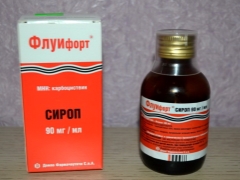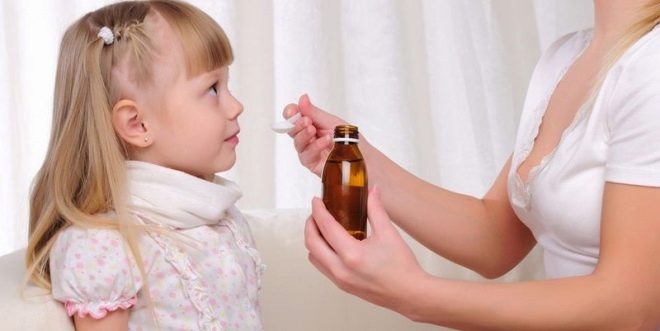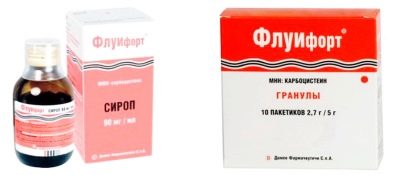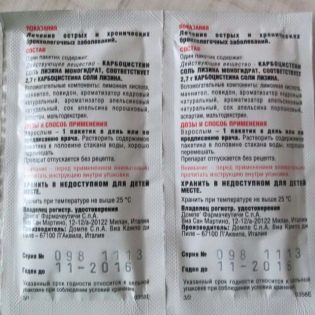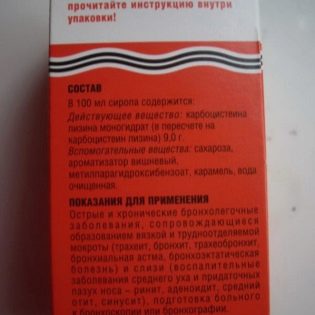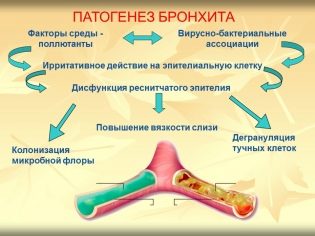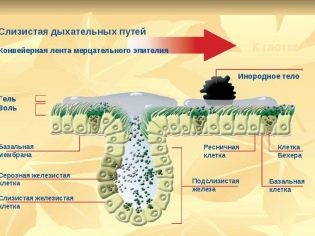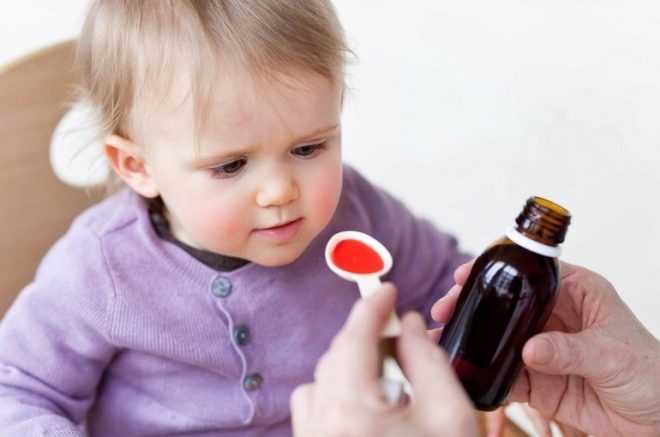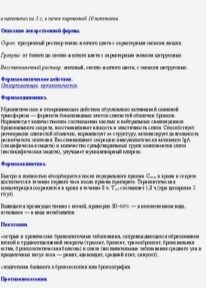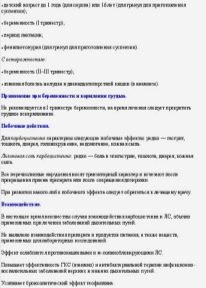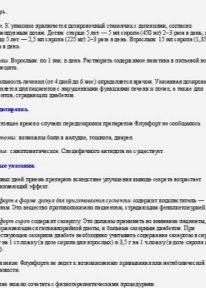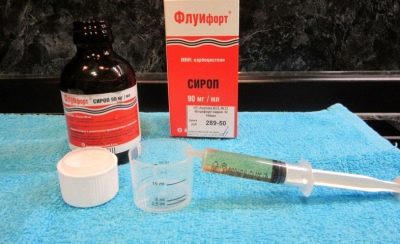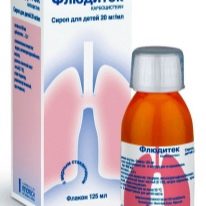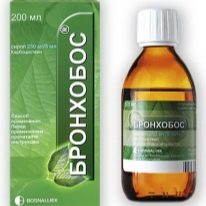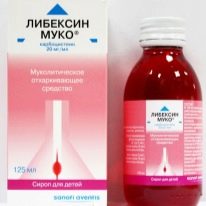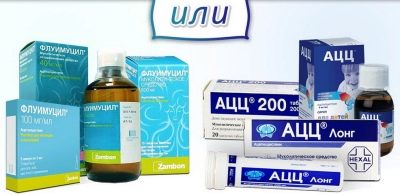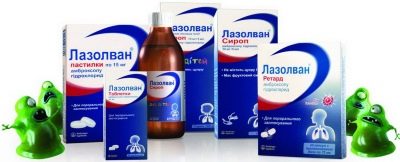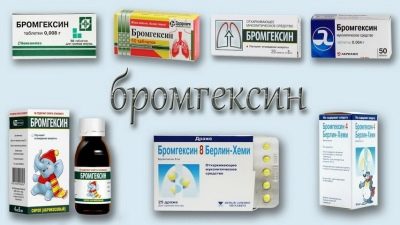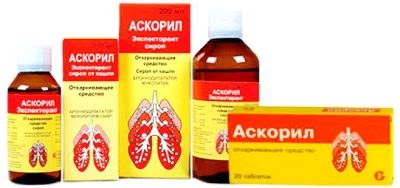Fluifort syrup for children: instructions for use
With the defeat of the airways, the properties of the secretions produced in their mucosa often change. It becomes more dense and prevents the purification of the respiratory tract, which affects the speed of recovery and provokes a painful cough.
To make sputum not so viscous, mucolytics are used, which also includes Fluifort. This syrup is often prescribed to children, as doctors consider it effective and safe. But so that he really helps a child with a cough, you should know about the features of its use in childhood.
Release form
"Fluifort" in the form of a syrup is a dark yellow liquid that smells like cherry. It is transparent and has a syrupy semi-fluid consistency. Such a drug is sold in bottles made of glass. To prevent the medication from deteriorating under the action of sunlight, such glass has a dark color.
In one bottle of "Fluifort" is 100 ml of medication. In the box along with the bottle there is a paper abstract and a dosing cup, on which 2.5 ml, 5 ml, 10 ml and 15 ml marks are visible. With it, you can accurately measure the desired dose of medicine prescribed by the doctor.
In addition to the syrup, there is another form of “Fluifort” - these are granules with a citrus scent, packed in portioned sachets. Of them are preparing a sweet-tasting citrus suspension. Due to the high dosage of this version of the drug is contraindicated at the age of 16 years.
Composition
The main ingredient of Fluifort is called carbocysteine. Unlike other drugs with the same component, carbocysteine is presented in the form of a lysine salt. The amount of such a compound in 1 ml of syrup is 90 mg. For sweetness, sucrose and caramel were added to the preparation, and natural cherry essence was added to the flavor. So that the product does not deteriorate before the expiration date, it contains methyl-para-hydroxybenzoate, and for a more liquid consistency, purified water is added to the medicament.
Operating principle
Carbocysteine has a property to influence the mucous secretion produced in the respiratory tract. This substance affects the cells (they are called goblet), which secrete mucus in the bronchi. By activating specific enzymes in such cells, as well as influencing the glycopeptides and mucins in the secretions, Fluifort restores the normal viscosity of mucus, which makes cough productive and facilitates the excretion of sputum from the respiratory tract.
The drug acts on the bronchi and paranasal sinuses. Under its influence, there is also a more active formation of immunoglobulin A and other factors of immune protection, which helps to quickly overcome the infection. In addition, Fluifort has a positive effect on the function of the ciliary epithelium and the state of the mucous membrane (accelerates its regeneration).
Indications
Most often, syrup is used in bronchopulmonary diseases, when the hard-to-separate and overly viscous sputum accumulates in the airways. "Fluifort" is in demand for tracheitis, asthma, bronchitis, bronchiectasis and other diseases. It is often prescribed for acute inflammation, but may also be prescribed in the case of a chronic course.
Since the drug also affects the state of mucus in the ENT organs, the syrup is also used for rhinitis, otitis media, sinusitis, or adenoiditis. In addition, Fluifort can be prescribed prophylactically if the patient has some kind of diagnostic manipulation on the airways, for example, bronchoscopy.
From what age is prescribed?
The use of “Fluifort” syrup in children is allowed from the age of 1, but it is recommended to give this remedy to a child of 1-3 years old only after an examination by a doctor.
If a mucolytic drug is needed for a baby of the first year of life, then Fluifort is replaced with an analogue approved for early age.
Contraindications
The use of syrup is prohibited:
- with exacerbation of gastrointestinal ulcer;
- in case of hypersensitivity to any of the ingredients "Fluifort";
- with hereditary disorders in the absorption of sugars.
If the drug is prescribed to a child with diabetes mellitus, it should be borne in mind that a tablespoon of syrup contains 6 grams of sucrose.
Side effects
When using "Fluifort" may appear:
- erythema, pruritus, urticaria, or other allergies;
- vomiting, diarrhea, or abdominal pain;
- dizziness;
- respiratory disorders.
All these negative symptoms are often temporary and disappear as soon as the syrup is stopped. When they appear, the child should be shown to the pediatrician.
Instructions for use
The syrup is picked up with a dosing cup and given to the child to drink undiluted. If required, it can be washed down with water. The drug is given twice or thrice a day. A single dose for patients under the age of five is 2.5 ml, and if the child is already 5 years old, he needs 5 ml of syrup at one time.
How long to take "Fluifort" a particular child, the doctor determines. Some patients have a short course of 4–5 days, while others require admission for a month or even longer.
Overdose
If a child accidentally drinks “Fluifort” in a larger dose, it can provoke digestive disorders, dizziness or skin allergic reaction. In such a situation, it is necessary to wash the patient's stomach and, if necessary, to give symptomatic means.
Drug interaction
The effectiveness of “Fluifort” will decrease if you additionally give child holinoblokatory or antitussive medications. When used with theophylline, a stronger bronchodilator effect of this drug is expected. If “Fluifort” is prescribed with antibacterial agents or glucocorticoid hormonal preparations, their therapeutic effect will mutually strengthen, which is used in the treatment of infectious lesions of the respiratory tract.
Terms of sale and storage
Fluifort syrup refers to over-the-counter medicines. The cost of one bottle varies in different pharmacies from 280 to 330 rubles. Store the tool at home should be below 25 degrees of heat, putting the bottle out of the reach of children. The shelf life of this form of "Fluifort" is 2 years.
Reviews
Fluide treatment with syrup responds mostly well. The taste of the drug is called pleasant, and the action is effective. According to parents, the drug quickly helps with dry cough with viscous sputum, making it more productive. A good effect means also noted with a cold, adenoiditis and sinusitis. Some moms call the price of medication low, while others consider it overestimated. Adverse reactions of the child's body during treatment with syrup are rarely detected.
Analogs
If it is impossible to use "Fluifort", it is often replaced with the drug "Fluditec". In childhood, only one form of this medicine is used - syrup, in 1 ml of which there is 20 mg of carbocysteine. This is a banana sweet medicine approved for the treatment of children over 2 years old. Other forms of Flutec do not apply until the age of 15. Other drugs with the same active component — 2.5% syrup “Bronchobos"(It can be applied from 3 years) or 2% syrup"Libeksin muko"(It is prescribed for children over 2 years old).
Among other mucolytics that can become an analogue of "Fluifort", a drug called "ACC" is especially popular. It comes in several forms. Children 2-5 years old are prescribed syrup, granular powder (100 mg bag) or soluble tablets "ACC 100". A child over 6 years old is prescribed "ACC 200", Which is produced in granules and effervescent tablets. There is also a solution called "ACC Inject", which is suitable for injections and for inhalation. It can also be used from the age of 6.
Analogues of “ACC” are the drugs “Fluimucil”, “Vicks Active ExpectoMed”, “N-AC-ratiopharm” and “Acetylcysteine”.
In addition to drugs based on carbocysteine or acetylcysteine, the doctor may replace Fluifort with drugs with a similar therapeutic effect, but with a different composition.
- "Lasolvan". The effect of this drug provides Ambroxol. The drug is available in syrup, tablets, solution and other forms. Children can be prescribed from birth, but in the first year of life "Lasolvan" is given only under the supervision of a specialist.
- «Ascoril». As part of this medication, there are not only bromhexin, but also two more components - guaifenesin and salbutamol. It is represented by syrup, which is prescribed for children over one year of age, as well as pills prescribed from 6 years of age.
For information on how to treat a child’s cough and how to speed up the healing process, see the next video.
